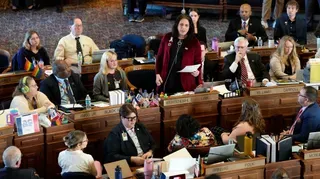October 23, 2014
EDGE 10.0: The Decade in CEOs
Steve Weinstein READ TIME: 8 MIN.
In celebration of our tenth anniversary, EDGE is proud to launch "EDGE 10.0: The Decade in," a retrospective series of features looking back on the past ten years of headlines, politics, personalities, trends, music, film, parties, etc... written by Editor in Chief Emeritus Steve Weinstein, and the current editorial staff at EDGE.
Perhaps no place affords a better view from which to survey how far we've come in the struggle for equality 10 years since EDGE was founded in Boston - and how far we have yet to go - than America's executive suites. Dramatic advances in education, religion, sports, entertainment, the military and nearly everything else are certainly important.
In President Calvin Coolidge's memorable phrase, the business of America is business. Work defines us. It's what preoccupies us during most of our waking hours. That's why it's so important to take note of the gay men and lesbians (and, yes, transpersons) who have ascended to the highest reaches of corporate life.
Back in May, Claire Cain Miller asked in a much-remarked New York Times column, "Where are the gay chief executives?" "One major realm of society lags behind" the strides made by LGBT Americans, she lamented. "Even today, the business world is one of the slowest sectors of society to adopt new norms of acceptance."
That's not to say there have been no out-gay business leaders. It's probably no coincidence that pioneering out-gay corporate leaders came from the traditionally more or less gay-friendly field of fashion and entertainment.
The two most prominent pioneers, Calvin Klein and David Geffen, have some interesting biographical intersections. Klein married early in his career and had a daughter. After his divorce, he developed a reputation as a gay blade during the Studio 54 days. At the height of the AIDS epidemic, he married again. As for Geffen, he most famously dated Cher. Geffen even lived for a time in Klein's old Fire Island oceanfront home.
Although both are shrewd businessmen, neither could be accused of conforming to the image of the button-down corporate clone. After making his first billion as a music impresario, Geffen became one of the Democratic Party's most influential donors. EDGE covered his very public spat with the Clintons during the 2008 presidential election, when his support proved crucial to Barack Obama's fledgling campaign.
As for Calvin Klein, a series of reports on EDGE detailed his notorious liaison with Nick Gruber, a model young enough to be labeled the fashion designer's boy toy. After their very public break-up Gruber was busted for drugs and assault, claimed Klein was stalking him, and made the mistake of locking horns with pornmeister Michael Lucas at a Fire Island circuit party.
Another top executive of a well-known fashion brand is out and proud. But whether the LGBT community is proud of him is an open question. As the CEO who helped position Abercrombie & Fitch as the go-to brand for teenagers of every age, Michael Jeffries undoubtedly imbued the brand with a distinctly gay sensibility. The ad campaigns by Bruce Weber (for years the photographer of choice for Klein as well) attracted controversy from the Religious Right and lust from gay men for their nakedly homoerotic imagery.
Jeffries has become equally notorious, however, for a style that is imperious and high handed even by the standards of contemporary titans of commerce. A&F has been assailed and sued for allegedly promoting good-looking Nordic types over less WASPy employees at every level. Two years ago, EDGE reported how an age-discrimination lawsuit from a former pilot of his lavish corporate jet revealed how Jeffries forcibly stage manages every detail of his life, down to attendants wearing black gloves while handling silverware but white ones while laying the table.
In contrast to Klein's flamboyance, Geffen's irascibility and Jeffries' grandliquoence stands Tim Gill, an assuming billionaire who has quietly and effectively worked to further the lives of LGBT Americans for years.
After Gill made a fortune starting Quark, the popular graphics-arts computer program, he became one of the most prominent and generous gay activists. Through his Denver-based private foundation, he has seeded LGBT initiatives across the country. He, heiress Pat Stryker, fellow tech pioneer and Member of Congress Jared Polis, and geologist Rutt Bridges, together known in Colorado as the Gang of Four, have transformed the Rocky Mountain state from a bastion of the Religious Right into one of the most progressive in the country.
In 2008, EDGE's Kilian Melloy wrote of Gill's address to the Colorado delegation to the Democratic National Convention in which he stressed how important it was that others use their own gay dollars to support pro-gay and out-gay political candidates.
Yet another out-gay tech pioneer stands in marked contrast to Gill - and indeed, to mainstream LGBT politics. One of the most enigmatic business leaders in the world, Peter Thiel is a venture capitalist whose early involvement with Facebook earned him a small role in the movie "The Social Network." He also co-founded PayPal and enough other early Web users to make him one of the wealthiest people in the country.
Thiel, by all accounts a brilliant intellect, has formed his own quirky libertarian ideology. An avowed devotee of novelist Ayn Rand, he follows her philosophy of englightened selfishness, to the point of having proposed an artificial island for self-reliant freethinkers like himself. To his credit, Thiel himself doesn't hide behind his wealth but eagerly engages others in public dialogue about the nature of capitalism. His earnest advocacy has earned him the nickname John Gault, after the mysterious hero of Rand's novel "Atlas Shrugged" who takes entrepreneurs into a hideaway where they can live without constraints of government or the rule of the mob.
Back in 2007, in a profile written for EDGE, Melloy noted that Thiel "quietly supports various causes but remains adamantly low key" about them. Even when he threw his support to Ron Paul for the 2012 GOP presidential nomination, he did it, according to an article by Jason St. Amand, "on the down low." Thiel was for years quietly bankrolling the far-Right group GOProud until he apparently ran out of patience for its self-aggrandizing leaders.
I can almost hear the reader yelling, "Enough already with the testosterone-filled macho guys Where are the ladies?"
That's a good question. Last year, Angela Kolter explained the results of research from two British academics. They discovered that, if women face a glass ceiling keeping them from top corporate jobs, for lesbians it's a "glass cliff." Which is why I'm happy to point out one woman who not only heads a well-known organization but in an industry where women CEOs, straight or gay, are few.
Laura Ricketts became head of the Chicago Cubs after her family acquired the baseball team in 2010. A well-known activist in Chicago, Ricketts could stand as Exhibit A in Cain Miller's central argument in the Times: Michael Sam's having been chosen for two NFL teams (albeit briefly) showed how much farther the supposedly ultra-macho and homophobic world of pro sports had evolved than Fortune 500 corporations.
Melloy noted at the time of the purchase family members had to be vetted by Major League Baseball for everything, including political activity. Ricketts' sexual identity was made crystal clear to league researchers. "In terms of the LGBT issue," Ricketts noted, "it was never an issue at all."
Alas, I have to end with another, far sadder, marker of how far big business world has yet to go to achieve true equality.
John Browne, the CEO of oil giant British Petroleum, wasn't ousted because of his ham-handed handling of the environmental disaster in the gulf. No, he was forced out after a newspaper alleged he misused corporate funds to benefit his hidden boyfriend of four years.
Forced not only from his job but also out of the closet, Browne became a reluctant spokesperson. Last year, he wrote a book entitled "The Glass Closet: Why Coming Out Is Good Business." As reported here, he complained that the media played up the scandal that outed him because the gay aspect made it inherently salacious.
"At its heart," Browne told a reporter, "it started about gay. If you re-read it and said 'straight,' if it was a man and a woman, I think it would have gotten a tenth of the coverage." It's sad that Browne still can't acknowledge that if he hadn't been so deeply in the closet, the unmasking of his personal life might not have been so gleeful.
Steve Weinstein has been a regular correspondent for the International Herald Tribune, the Advocate, the Village Voice and Out. He has been covering the AIDS crisis since the early '80s, when he began his career. He is the author of "The Q Guide to Fire Island" (Alyson, 2007).







